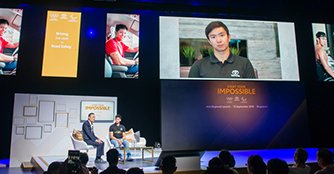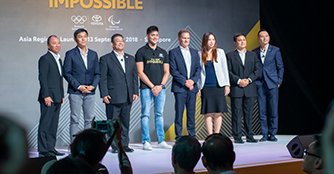Toyota embraces the challenge of tomorrow and imagines what is possible
25 Sep 2018|5,525 views
What does the future look like? That's the question that has plagued humanity since the start of time. The future is a vague, opaque and mysterious thing - one that you can only fully know when it truly exists.

These are the very same questions the Toyota brand is asking, not just of itself, but also of the world around us.
Challenge what is possible
Toyota Motor Corporation is one of the biggest and most prominent car brands in the world, delivering countless cars to drivers all around the world since its formation in 1937. However, Toyota actually first began producing weaving looms. The decision to begin manufacturing passenger cars and become a car brand was a big step into the unknown for the brand.
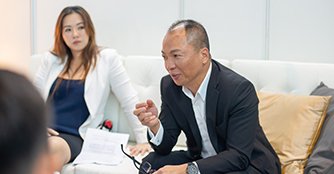
According to Mr. Hao Quoc Tien, Executive Vice President, Toyota Motor Asia Pacific, "Start Your Impossible isn't just a campaign, it's a global initiative to change our company from a car company to a mobility company. This is a change of philosophy and way of doing business. As a company, we are taking on the challenge of creating an inclusive, sustainable and mobile society, one where everyone has an equal opportunity to achieve their dreams."
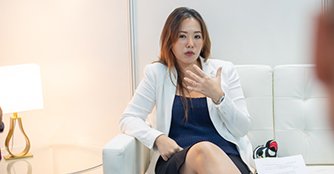
Start Your Impossible is a wide-spanning initiative with grand ambitions. As the key mobility partner for the 2020 Tokyo Olympic Games and Paralympic Games, Toyota is embracing sports as a platform for leading this drive towards change.
Why sports? Sports draws on a common passion shared among all of us - competition, victory, celebration, and the ability to unite people. But behind these fleeting moments of celebration and victory are countless hours of hardwork, dedication and perseverance. These are values that Toyota embraces, the keen understanding that nothing comes easy, especially when it comes to overcoming one's challenges. And ultimately, it is the endeavour to become better.
As Mr. Hao tells us, "I would hope that when people think of Toyota, they would think about the challenge that we have set ourselves to be the best we can. And, this isn't just about Toyota specifically. Rather, it's for everyone, to challenge and overcome obstacles to make their dreams come true."
Toyota and Borneo Motors Singapore (BMS) are leading the way forward when it comes to supporting local athletes and their social causes. Leading the way in this Start Your Impossible initiative are swimmers Joseph Schooling and Toh Wei Soong, who will each lead social campaigns championing road safety and equal opportunity respectively.
BMS is also actively working towards making its facilities disability-friendly, both for its Inchcape offices, as well as the Borneo Motors showrooms. Additionally, BMS will work with the Singapore National Olympic Council (SNOC) and Singapore National Paralympic Council (SPNC) to offer employment opportunities to athletes. As Ms. Jasmine Wong, Managing Director BMS, tells us, "We want to emphasise that for athletes, there is a life after sports. BMS will do our part by working with the SNOC and SPNC to provide opportunities for athletes to make the transition from a sporting career to a professional career."
BMS also hopes that it will drive a movement that will motivate other organisations to also actively employ athletes with the necessary skills, passion and drive that can contribute to the workforce. Ultimately, it is about offering equal opportunity to everyone. Ms. Wong adds, "We don't want to screen people out because of any kind of disability or handicap. Everyone will be given a fair opportunity based on their qualifications, and we hope that every year, we can work with the SNPC to bring in a number of new employees."
Challenge the future
Of course, a key facet of the future of the automotive industry is technology. In this respect, we can expect Toyota to be at the very forefront of innovation and technological development.
Sustainability will of course form a key part of this. As the manufacturer of the first mass-produced hybrid vehicle in the world (the Toyota Prius), sustainable technology has always figured in the brand's product development and philosophy. Moving forward, we can expect to see even more developments in sustainable technology. The 2020 Tokyo Olympics will see the introduction of the Mirai and Sora fuel cell electric vehicles, which will ferry athletes from the Olympic village to the various competition venues.
Mr. Hao also tells us that electrification will play a key part of Toyota's product strategy, as the brand continues to develop and diversify its electric vehicle iniative. Presently, hybrid electric, plug-in hybrid electric and fuel cell electric vehicles are already available, with a full-battery electric model expected in 2020. Driven by legislative demands as well as specific market needs, we will continue to see hybrid technology spreading out to the rest of the brand's model lineup.
Mobility is changing, too. The way people use and think about cars is changing, with a detectable shift from an ownership model to a service model. This is something Toyota and BMS is keenly cognisant about, and something that is clearly being embraced. "By elevating our business to mobility services, we are opening up many other opportunities as well," says Mr. Hao.
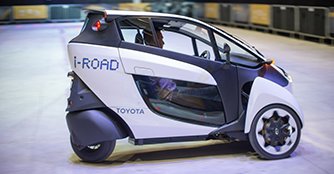
While it is unlikely that vehicles such as these will begin to populate our roads in the near future, they highlight what is possible for the brand, not just in manufacturing, and in changing the actual fabric of cities. As cities become more dense and commuters move away from the traditional car ownership model, shared mobility services allow people to get around conveniently and quickly, and in a way that's sustainable to the environment as well. "Embracing this service-centric business model, and developing the a business that's future-proof, is a practical approach to securing business in the future," adds Mr. Hao.

And of course, the promise that Toyota will be at the forefront to lead the way.
What does the future look like? That's the question that has plagued humanity since the start of time. The future is a vague, opaque and mysterious thing - one that you can only fully know when it truly exists.

These are the very same questions the Toyota brand is asking, not just of itself, but also of the world around us.
Challenge what is possible
Toyota Motor Corporation is one of the biggest and most prominent car brands in the world, delivering countless cars to drivers all around the world since its formation in 1937. However, Toyota actually first began producing weaving looms. The decision to begin manufacturing passenger cars and become a car brand was a big step into the unknown for the brand.

According to Mr. Hao Quoc Tien, Executive Vice President, Toyota Motor Asia Pacific, "Start Your Impossible isn't just a campaign, it's a global initiative to change our company from a car company to a mobility company. This is a change of philosophy and way of doing business. As a company, we are taking on the challenge of creating an inclusive, sustainable and mobile society, one where everyone has an equal opportunity to achieve their dreams."

Challenge ourselves
Start Your Impossible is a wide-spanning initiative with grand ambitions. As the key mobility partner for the 2020 Tokyo Olympic Games and Paralympic Games, Toyota is embracing sports as a platform for leading this drive towards change.
Why sports? Sports draws on a common passion shared among all of us - competition, victory, celebration, and the ability to unite people. But behind these fleeting moments of celebration and victory are countless hours of hardwork, dedication and perseverance. These are values that Toyota embraces, the keen understanding that nothing comes easy, especially when it comes to overcoming one's challenges. And ultimately, it is the endeavour to become better.
As Mr. Hao tells us, "I would hope that when people think of Toyota, they would think about the challenge that we have set ourselves to be the best we can. And, this isn't just about Toyota specifically. Rather, it's for everyone, to challenge and overcome obstacles to make their dreams come true."
Toyota and Borneo Motors Singapore (BMS) are leading the way forward when it comes to supporting local athletes and their social causes. Leading the way in this Start Your Impossible initiative are swimmers Joseph Schooling and Toh Wei Soong, who will each lead social campaigns championing road safety and equal opportunity respectively.
BMS is also actively working towards making its facilities disability-friendly, both for its Inchcape offices, as well as the Borneo Motors showrooms. Additionally, BMS will work with the Singapore National Olympic Council (SNOC) and Singapore National Paralympic Council (SPNC) to offer employment opportunities to athletes. As Ms. Jasmine Wong, Managing Director BMS, tells us, "We want to emphasise that for athletes, there is a life after sports. BMS will do our part by working with the SNOC and SPNC to provide opportunities for athletes to make the transition from a sporting career to a professional career."
BMS also hopes that it will drive a movement that will motivate other organisations to also actively employ athletes with the necessary skills, passion and drive that can contribute to the workforce. Ultimately, it is about offering equal opportunity to everyone. Ms. Wong adds, "We don't want to screen people out because of any kind of disability or handicap. Everyone will be given a fair opportunity based on their qualifications, and we hope that every year, we can work with the SNPC to bring in a number of new employees."
Challenge the future
Of course, a key facet of the future of the automotive industry is technology. In this respect, we can expect Toyota to be at the very forefront of innovation and technological development.
Sustainability will of course form a key part of this. As the manufacturer of the first mass-produced hybrid vehicle in the world (the Toyota Prius), sustainable technology has always figured in the brand's product development and philosophy. Moving forward, we can expect to see even more developments in sustainable technology. The 2020 Tokyo Olympics will see the introduction of the Mirai and Sora fuel cell electric vehicles, which will ferry athletes from the Olympic village to the various competition venues.
Mr. Hao also tells us that electrification will play a key part of Toyota's product strategy, as the brand continues to develop and diversify its electric vehicle iniative. Presently, hybrid electric, plug-in hybrid electric and fuel cell electric vehicles are already available, with a full-battery electric model expected in 2020. Driven by legislative demands as well as specific market needs, we will continue to see hybrid technology spreading out to the rest of the brand's model lineup.
Mobility is changing, too. The way people use and think about cars is changing, with a detectable shift from an ownership model to a service model. This is something Toyota and BMS is keenly cognisant about, and something that is clearly being embraced. "By elevating our business to mobility services, we are opening up many other opportunities as well," says Mr. Hao.

While it is unlikely that vehicles such as these will begin to populate our roads in the near future, they highlight what is possible for the brand, not just in manufacturing, and in changing the actual fabric of cities. As cities become more dense and commuters move away from the traditional car ownership model, shared mobility services allow people to get around conveniently and quickly, and in a way that's sustainable to the environment as well. "Embracing this service-centric business model, and developing the a business that's future-proof, is a practical approach to securing business in the future," adds Mr. Hao.

And of course, the promise that Toyota will be at the forefront to lead the way.
Thank You For Your Subscription.





















